Jah Wobble (AKA John Wardle) is defined by bass guitar. He’s not just a bass player but an exponent of every possible avenue of bass playing, be it Celtic, industrial, post-punk, dub and beyond. Talking to him inevitably involves a discussion about Public Image Ltd, the band he formed with John Lydon and Keith Levene in 1978, where he helped to sculpt a bass-led approach to post-punk songwriting. He talked to us about PIL, Sid Vicious, working on the Tube and beards PB: Thanks for taking time out to speak to us. ‘Metal Box Rebuilt In Dub’: why now after 42 years? And how have you differentiated from the original? JW: Well, to be honest, it’s not a snap thing because we do some of the numbers live. Anyway, we do a repertoire of some of the old Public Image songs, plus I did release a couple of them or more in the past on Cherry Red Records. I think, and there was another record that has come out – I can’t remember the name of the label – where we did some cover versions of those old songs. I have done it before, and the opportunity came in lockdown to really, really get focused on it and I was very excited at that because I just felt I can actually take it a step further than I have done with the live performances. PB: I remember back in 1979, when I thought that I was the hippest guy in South Manchester, walking into Virgin Records in town buying the original 'Metal Box' on the day of release. I got it home and I remember specifically where I was and when it was, I put it on the turntable, listened to 'Albatross' and thought “What the fuck is this?” JW: [Laughs]. PB: It was probably mid to late 80’s before I appreciated what a major work it was. What were you hoping to achieve when you actually released it? Because it was like nothing else that has ever happened ever in the history of the world. JW: Yeah I think that we started with Public Image’s single with the band first of all and then I might have had chats possibly with Keith or whoever, along the lines of… not that we spoke much to be honest, but along the lines of: “we’ve done that and then we can take it to here or take it to there or, we could go straight to a certain point which is beyond all kind of moral constraint and musical linguistic designation,” if that makes sense, beyond all musical grammar. Just like a great big expressionistic painting or something. Stand away from the tyranny and the bourgeois, the values of chordal music and arrangements and just doing something that’s very guttural and primal and visceral really. Also, I was so fortunate that I was a fledgling bass player and was able to be in a situation where the bass was able to lead, which was pretty unusual. PB: Aren’t most of the tracks bass-led, if I remember rightly? JW: Yes, and so I was able just to do my things, whereas normally if you're a fledgling bass player they expect you to follow the guitarist's guitar chords and all that. So I was able to step to the forefront. I was very fortunate. PB: Just going to back to what you mentioned before, the first Public Image single, I do recall the video and you adopted this persona whereby you sat down, played the bass with shades on and a hat on and became the coolest guy on 'Top of the Pops'. Did you mean to do that? Nobody sits down and plays the bass. JW: Yeah, I preferred sitting down and needed to sit down, I still like sitting down because I think you can play a little bit more accurately actually when you’re sitting down and you’re kind of centred, so I still like sitting down. I can play standing up, but I like sitting down. I have even taken it further in some gigs and had chaise lounges on and actually a little table with a pot of tea. The roadies bring a nice brew of tea for me and I put my feet up and have even got the ‘Daily Mirror’ there. It’s a little bit tongue in cheek, but I always like playing in a relaxed way, so it suited me. And also of course, pathetically, I was a big Clint Eastwood fan, so I just thought, “Oh great, I know I can dress like Clint Eastwood.” it was quite ridiculous really, but you know how it is. PB: You dressed like 'Django Unchained;' for thirty years prior to the film being released, I think. JW: [Laughs} Yeah, exactly, PB: Super cool. JW: It was when we went on 'Top of the Pops;, the first thing I thought was “Oh great I’ll go and get my teeth blacked out” because at that time a lot of the bands were very snobby and funny about playing 'Top of the Pops', I They felt it wasn’t very real because you mimed. Well, I loved it. I was determined to mime and I wanted to mime because I thought, “If we mime it’s great, it can just be like a fun day, I don’t have to do my playing, I can get high, get drunk, and I can have some fun.” PB: [Laughs] JW: The first thing I wanted to do was get my teeth blacked out and get a black eye painted on. They just wouldn’t do the black eye, but they did do the tooth thing, so it looked like I had my tooth knocked out. PB: When you did the dub version of ‘Metal Box’, did you have to seek permission off any of the other guys in the band or did you just go ahead and do it? JW: Oh no, [it was more] the record companies, the various publishing side of things I believe, but yes. We got the right to do it. I think I could go and do Beatles cover. PB: Do you still speak to the other two guys? JW: No, I haven’t spoken to either of them for a while. I do speak to Keith. I get on with him, but I haven’t spoken to John since… it must be since 2006. We went out and had a curry. That was the last time I actually saw him. We got on that night and we fell out again a bit after about the money…you know how it is! PB: I saw PIL at The Ritz in Manchester, it must have been 2½ years ago, and you weren’t there. JW: Oh, no, I turned it down, I didn’t want to be in the new line up of it because the business wasn’t good as much as anything, plus I wouldn’t want to have played the kind of late 80’s PIL stuff to be honest. I was asked, but we didn’t even get off first base. I think I was offered £1,500 a week when gigging was £1,000 a week rehearsing. That’s not bad money, but if you’re a founder member of a big band the kind of money that would be coming through when you’re playing at bigger venues is substantial. And there was no mention of merchandise even. It’s like: “No, I’ll pass”. I think most people would see it as an unreasonable sort of attitude, but that was just to start of it. I also had a feeling it would be done in a way that I wouldn’t really have agreed with, so it wasn’t a big deal, we didn’t even get off the first base and that was that, but it was fine not to do it. PB: When people think of The Wobble, they think automatically Public Image Limited, but I assume your musical taste and career started off way before then. Is that back to Kingsway College John Lydon or even before that? Where did it all begin? JW: Yeah, I met John when I was like 15 or 16 or something like that. He was a bit older than me. He had had meningitis and so he had missed some schooling and so went to the College of Further Education and I had been expelled from school so I had to go there to try and do GCSE’s. I got on with him. PB: Expelled for what? JW: Well actually, I was a naughty boy. = I was a nuisance and probably worthy of getting expelled but when I was done, it was a fit up. It really wasn’t me. Somebody was supposed to have been riding a motorbike around the school, I know who it was, my mate Ronnie Britton. It wasn’t me. I didn’t even ride a motorbike at the time, and so I got a letter saying if I went anywhere near the school, they would call the [olice. It was a bit unfair, but I think I was fitted up so they could get rid of me. PB: So you ended up a Kingsway College? JW: I ended up at Kingsway. I've got to say with the old school, I met a teacher, a very nice guy, a big PIL fan, who had been there for years but he had joined after me and he asked me if would come and do the prize giving and I said: “You know I was expelled” and he said we don’t need to talk about that. I said: “No it’s not right, that’s like saying you’ve won.”. After all these years I had won. I was right, but I still wouldn’t do it. But yeah, I ended up at Kingsway and so then Sid came the following year. John had already done a year at Hackney College and for some reason went to Kingsway so Sid followed him, I was there, met John and then later on met Sid. PB: What type of music were you into in those days? JW: Very much reggae. I've always been into reggae, and I really, really liked Stevie Wonder, so that was the stuff I liked. I loved ‘Quadrophenia’ by The Who. I don’t like much rock stuff but when I do, I really like it. PB: One thing I do want to ask you specifically is about the media building up a kind of a caricature of Sid. How does that compare to what he was really like? JW: Well, yeah, that is a good question. I did a documentary on him once which I think it was on BBC Radio 3 and I actually got the people that looked after him when he come back to London as a teenager. He had gone off to Ibiza with his mum and she was a bit of a drug user and so he went to primary school near to Piccadilly Circus and he lived in Covent Gardens, which was quite a run-down area at that time. Then he went off to Ibiza again with his mum and they came back and they lived in Tunbridge Wells of all places! I did an interview back then, I think it was with a guy called Pat Gilbert, and he wanted to do an interview with Sid and about Sid. I told him that the only time I can really do is at a Tunbridge Wells gig I was doing. He came to see me, so said to him at the start of the interview: “I'm sorry to drag you out here to do the interview – you couldn’t think of a place further away from Sid.” He said: “it’s funny you say that, as he lives around the corner from this venue” and I was like “What the fuck?”. Even I didn’t know that at the time. Then they moved to Bristol, so when he moved back to London to Queensbridge Road, Hackney, he had a Bristolian accent. PB: I've actually heard that radio programme. it’s in three parts and it’s on BBC Sounds. JW: Oh is it? The BBC has still got it up. That’s great. I’m very proud of it. And as you know the people that I got on that show were my mate Terry Penton and people that I was mates with. I've known Terry for years and never even knew he knew Sid. He was the guy that put him up when he got kicked out by his mum. It was obviously he was a flesh and blood kind of person, really damaged and set up to be a drug user. It was inevitable and very sad. But he was a laugh and very intelligent. Not the one-dimensional cartoon character he is portrayed as. PB: I know you have been asked this a million times, but I have to ask it again, where did the name Jah Wobble come from? JW: It came from Sid! We were trying to get our flat door open. Somehow, we had lost the key. We were both really badly drunk. He had been on brown ale all night. Not sure why I remember that, but he loved brown ale. Anyway, we couldn’t get through the door. We couldn’t even get the fucking key into the door lock, and he just turned to me slurring, “Your name is John Wardle so I'm going to call you Jah Wobble. Jah is for Reggae and Wobble is because I can’t fuckin’ say Wardle. I'm going to remember that, I’m going to write that down and I'm going to use that from now on and no-one will forget it.” I think he forgot it by the next morning, but I didn’t. PB: After PIL, is it correct that you went working on the Underground? JW: I went working on the Underground, well after PIL. I left Pill in 1980 and I went straight off working with 'The Human Condition' and then did some stuff with Can. Then I did 'Snake Charmer' with The Edge and Francoise Kevorkian, so my stock was quite high. It was in 1982 that I formed Invaders of the Heart. I was really busy from when I left PIL, right the way through to ‘83/’84 doing loads of recordings and gigs. It was a fantastic time but when I was in PIL I took cocaine and speed and then I stopped. Then in ’84 we were touring I started again taking coke. I was boozing a lot anyway, but it just really escalated. I developed a real problem with it and so I stopped in ’86. I was making an album called 'Psalms' so I did half of it boozed up, still using on half of it, the other half getting sober. I needed to get regular work and I did a courier job, then I went on the on the Underground, so it was well past PIL. I can’t blame PIL for me being on drink and drugs. You’ve got to have a predilection, a tendency towards that anyway. PB: Didn’t you make some kind of announcement that has as gone down in Underground history? JW: Yeah it was on the Eastbound District Line at Tower Hill, probably Platform 1. It’s got three platforms there. So it was the Eastbound and I was actually feeling a bit of a devil but I was happy. The platform was filling up a bit, and there was a delay. The intercom was on the wall, I went to the wall and rather give an announcement about the delays I said “I used to be someone, I repeat I used to be someone.” And everyone said “What the fuck did that guy just say?” and they were murmuring, there was movement through the crowds all the way down the platform. I just thought it was hilarious, I loved that job and if I have got any regrets in life, I've got a slight regret at leaving. PB: What were you actually doing on the Underground? JW: Well I crossed a divide. I started out as station staff and crossed the divide over to train crew which is actually quite unusual. Certainly at the time it was. As train crew, I was a guard but I had to learn to drive immediately, which was great. I don’t have a huge regret but believe it or not, if I could go back in time, I might have changed things and stayed on and still performed in music. PB: After you left the Underground, you build up a massive back catalogue of stuff and I note a huge interest in world music if I can put it that way. How did that develop? JW: I used to listen to short wave radio a lot, I love short wave radio, I like the static and the oscillations and everything. That’s really what I was fascinated with and in so doing stumbled across Radio Cairo. You get that lovely phasing sound of shortwave radio as it bounces down to earth and back up to the stratosphere and down again. You cover long distances with short wave. It’s heard over a massive area unlike FM. I can listen to a broadcast from Africa and everyone in Europe and in between can listen to that broadcast. I love that. In a way, that was how I started to hear it. But I also had a tendency to like folk music and roots music, which was obviously Jamaican music at the time. Now it’s become our music as well, it has become as much a British thing as a Jamaican thing. I know London Reggae had its own sound. I had a tendency to like music from around the world. I like Indian drums and the same with Indian books. I was reading the Upanishads at age 15. These are Indian holy books. I was bought up a Catholic, but I was very drawn to that stuff. PB: I was going through your back catalogue with my business partner separately and we both decided our favourites are the Japanese and Chinese dub albums because they are absolutely crazy, but they are great. I love those. JW: Thank you! The Mrs is Chinese and my sons are Chinese musicians. They have got mixed heritage, as they say nowadays, but they play Chinese music. I wasn’t a trained musician so I didn’t really know chords, I wasn’t that interested in chords and one of things I liked about most world music, they don’t deal with harmony as such, it’s just rhythm and melody.They don’t really have chordal structures and that suited me down to the ground. If you went back to 'Metal Box', you don’t have that many chords on there on there as such, it’s quite modal. PB: Excellent. Thanks for your time today. Just one final question to finish it all off. You are famous for beards – big and little – how big is it at the moment? JW: Oh! I trimmed it yesterday and actually I trimmed it without using the comb. I think I've done alright. So it’s more short than long but it’s not shorty short. The great thing when you do have a long beard is to go to a Turkish barber for a proper shave. It’s a great feeling psychologically. PB: On that note, thank you very much for your time.
Band Links:-
https://jahwobble.com/https://www.facebook.com/Jah.Wobble.Music/
https://twitter.com/realjahwobble
Play in YouTube:-
Have a Listen:-
Picture Gallery:-
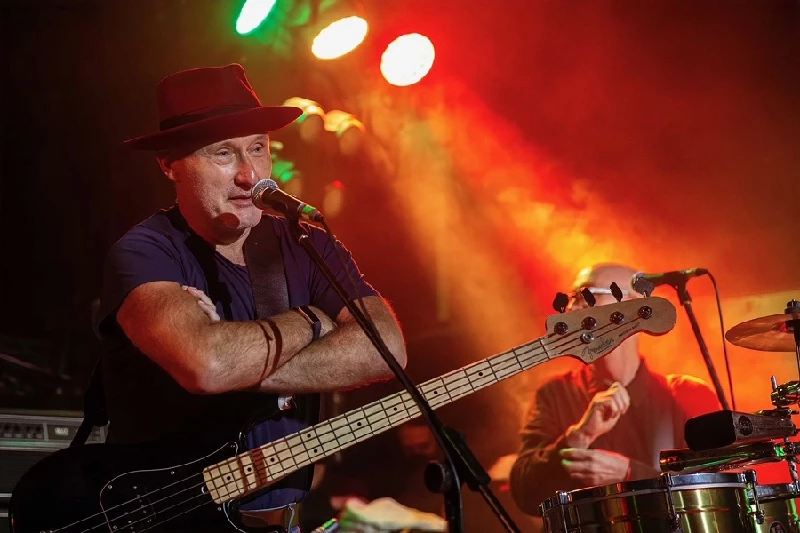
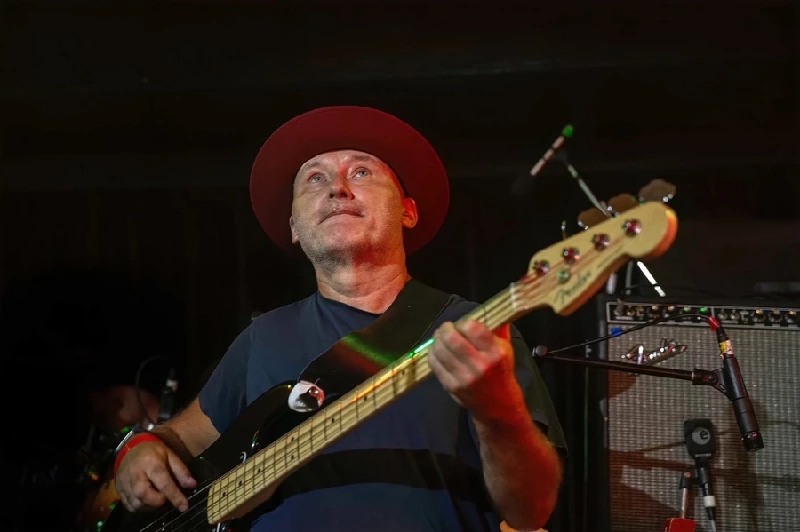
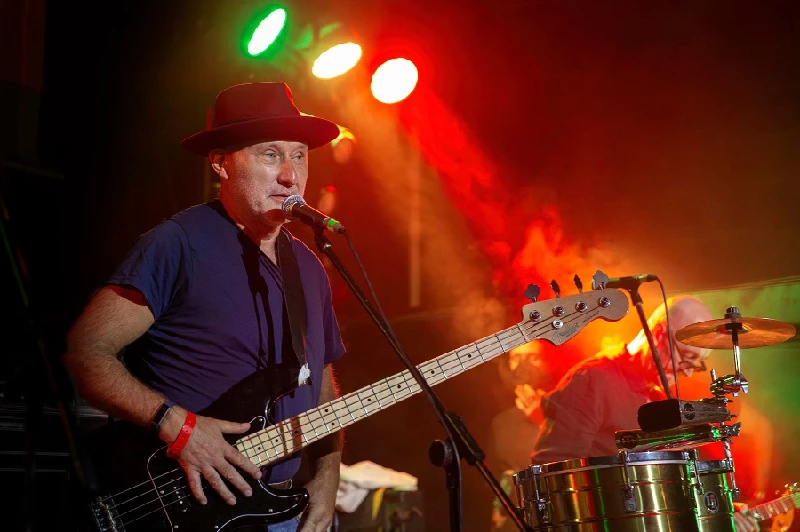
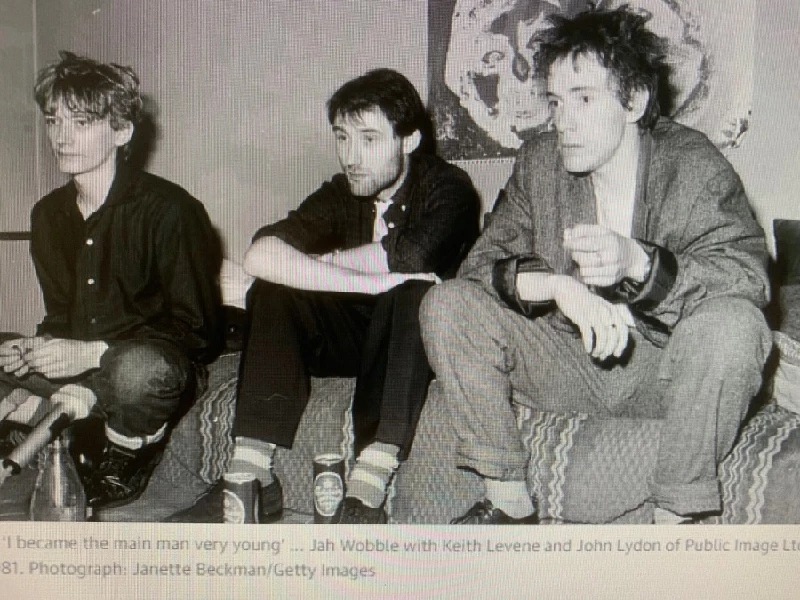
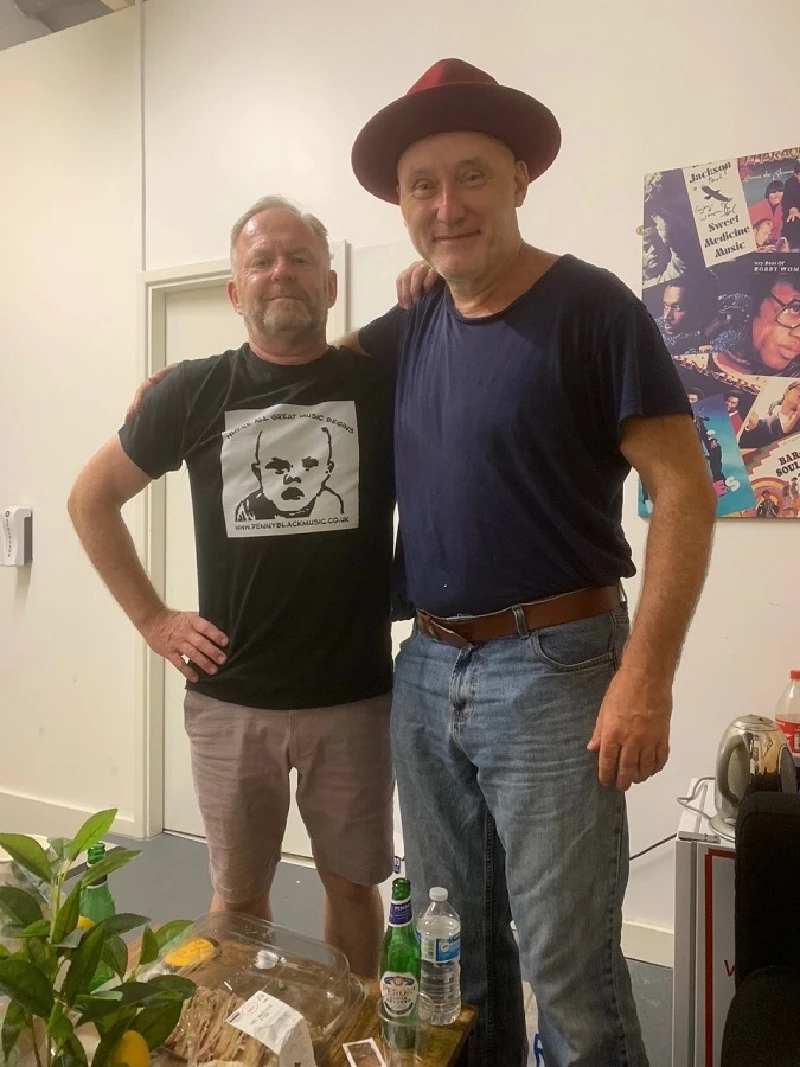
Visitor Comments:- |
| 2111 Posted By: Paul, Adelaide Australia on 28 Dec 2021 |
|
Min reason i like the first to albums, the bass, my speakers cant take the pace because wobble is on the bass
|
intro
Jah Wobble talks to Andrew Twambley about his time in Public Image Ltd and his new dub reworking of their 'Metal Box' album.
interviews |
|
Interview (2020) |
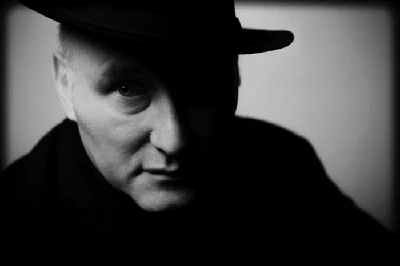
|
| Acclaimed musician and songwriter Jah Wobble talks to Adrian Janes about his time as the original bassist in Public Image Ltd, his musical and philosophical heroes and his band the Invaders of the Heart. |
profiles |
|
Profile (2015) |
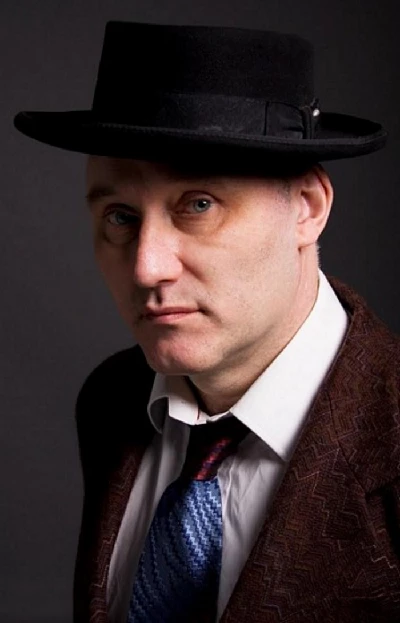
|
| Adrian Janes examines 'Redux - Anthology 1978-2015', a sumptuous new six CD box set of ex-PiL bassist Jah Wobble’s fascinating musical voyages |
live reviews |
|
Donkey, Leicester, 30/5/2015 |
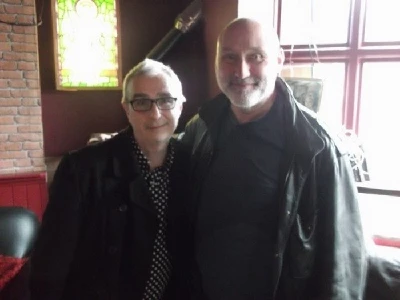
|
| Anthony Strutt watches Jah Wobble play of the year's hottest gigs of the year at The Donkey, one of Leicester's best kept secret venues |
most viewed articles
previous editions
Cindy Smith Dunaway - InterviewAlice Cooper - 50th Anniversary of the Alice Cooper Group Original Line-Up Celebration Part 2
Bram Tchaikovsky - Profile
Slow Readers Club - Manchester Cathedral, Manchester, 4/5/2018
Miles Kane - Academy, Manchester, 23/11/2018
Black Peaks - Photoscapes
Harold F. Eggers - My Years with Townes Van Zandt: Music, Genius, and Rage
Andy Whitehouse - Interview
Asian Dub Foundation - Rafi's Revenge
Peter Doherty and The Puta Madres - Ritz, Manchester, 9/5/2019
most viewed reviews
current edition
Lapsley - I'm a Hurricane, I'm a Woman In LoveBlueboy - 2
Davey Woodward - Mumbo in the Jumbo
Philip Jeays - Victoria
Eddie Chacon - Lay Low
Suzanne Vega - Flying With Angels
Taylor Austin Dye - Sick of Me
Only Child - Holy Ghosts
Nigel Stonier - Wolf Notes
Cynthia Erivo - I Forgive You
related articles |
|
: Feature (2024 |
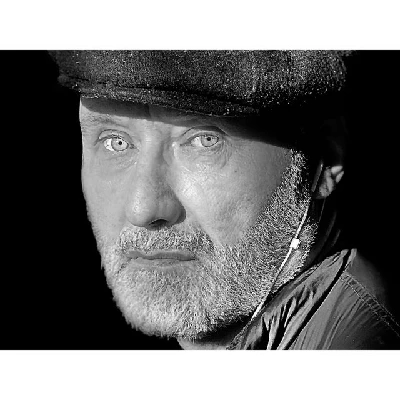
|
| In his ''In Dreams Begin Responsibilities' column Steve Miles talks to former Public Image lLd bassist, solo artist and practising Buddhist about his top tips for being happy. |
Pennyblackmusic Regular Contributors
Adrian Janes
Amanda J. Window
Andrew Twambley
Anthony Dhanendran
Benjamin Howarth
Cila Warncke
Daniel Cressey
Darren Aston
Dastardly
Dave Goodwin
Denzil Watson
Dominic B. Simpson
Eoghan Lyng
Fiona Hutchings
Harry Sherriff
Helen Tipping
Jamie Rowland
John Clarkson
Julie Cruickshank
Kimberly Bright
Lisa Torem
Maarten Schiethart